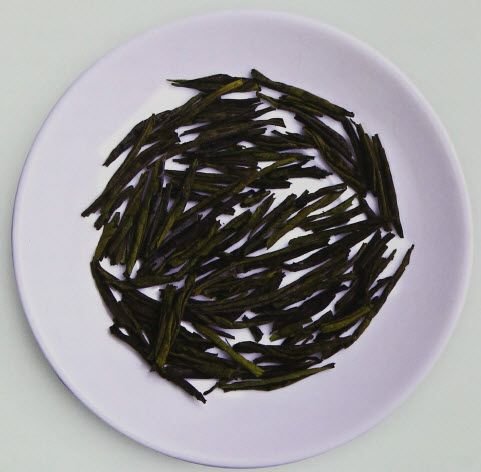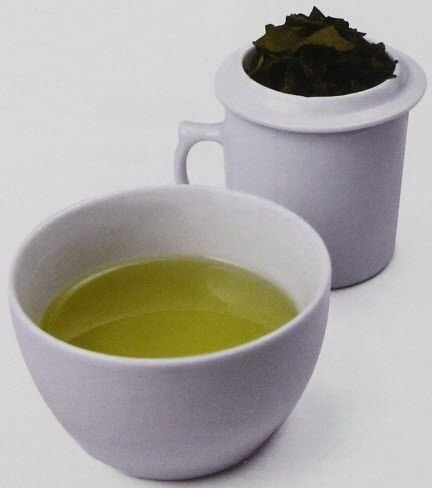Table of Contents
Learn More about Liuan Guapian Tea
Liuan Guapian Tea Introduction
Lu’an Guapian is a famous historical tea, also known as sliced tea. It is the only special green tea among Chinese famous teas that is made from a single fresh leaf without buds and tea stems. The appearance of Lu’an Guapian tea is straight and even, with the edges of the leaves curled back and spread flat, like melon seeds, and the color, aroma, taste and shape are all on this melon seed-shaped leaf.
Liuan Guapian Tea History
Lu’an Guapian Tea was created in the late Qing Dynasty and is one of the top ten famous teas in China. In 2010, at the Fifth China Tea Industry Expo in Anhui Province, the “Huashan Brand” floral-scented Lu’an Guapian Tea won the gold medal for its unique aroma.
Liuan Guapian Tea Origin
The adjacent mountainous areas and hills of Jinzhai County and Huoshan County in Lu’an City, Anhui Province are divided into two production areas: Neishan Guapian and Waishan Guapian.
Liuan Guapian Tea Production Process
The picking time of spring tea is around Grain Rain and ends before Grain Full. The picking is for strong rather than tender leaves, and the fresh leaves must be picked when they grow to “open”. The picking standard is fresh leaves with two or three leaves and one bud, two leaves and three leaves. They are picked in the morning and sliced, stemmed and budded in the afternoon. After the fresh leaves are picked, they are sliced, fried in a raw pot, fried in a cooked pot, pulled on a rough fire, pulled on a low fire, pulled on a long fire, etc. When baking, a large baking cage (locally called a lifting basket) is used to hold the tea, and charcoal is used to make the fire. The basket is lifted and baked. One cover is lifted, and two or three pairs of baking baskets are alternately carried out, one lift and one step, while baking and turning, with a tight rhythm and tacit cooperation, like dancing an ancient dance.
Liuan Guapian Tea Purchase Guide
Lu’an Guapian is divided into inner mountain Guapian and outer mountain Guapian. The inner mountain Guapian is produced in Xianghongdian, Xianhualing, and Gongdian in Jinzhai County; Zhufoan in Huoshan County; Huangjianhe, Shuangfeng, Longmenchong, and Dushan. The outer mountain Guapian is produced in Shibanchong, Shizigang, Shipodian, Luojiaan, and Qingshan in Lu’an City. The best quality is produced in Qitoushan, Huangshi, Hongshigu, Lichong, and Huangchaojian. Lu’an Guapian is divided into five grades: business card (business card is only produced in the mountains around Qitoushan, with the best quality, and is the best of Lu’an Guapian) and Guapian 1, 2, 3, and 4. Now “Qishan business card” is divided into 1 to 3 grades, and inner mountain Guapian and outer mountain Guapian are divided into 4 grades and 8 grades respectively. Well-known brands include “Hui Liupai” Lu’an Guapian.
Liuan Guapian Tea Quality Identification
A single piece of Lu’an Guapian tea does not have a stem bud, the leaf edge is curled toward the back, the color is sapphire green, and it is moist and frosty (whether there is frost is one of the criteria for identifying Lu’an Guapian). The tea soup is clear and bright green, the aroma is noble, and the aftertaste is long. The leaves are thick and durable. Good Guapian have the fragrance of orchids, and the first brew is the aroma of cooked chestnuts.
Liuan Guapian Tea Brewing Method
Lu’an Guapian Tea is best brewed in a glass cup with a water temperature of about 85°C. You can first pour a small amount of boiling water (just enough to cover the tea leaves) to moisten the tea, then shake the tea leaves to fully dissolve the tea leaves’ contents into the tea soup.
Related Products of Liuan Guapian Tea
Compressed Tea
Zhangping Shuixian Tea
Zhangping Narcissus is a famous historical tea, also known as “paper-wrapped tea”, with a history of sixty to seventy years. In 1995, Zhangping Narcissus won the gold medal at the Second China Agricultural Expo and was included in the “Chinese Famous Tea List”.
Compressed Tea
Gold Brick Tea
Golden Brick is a newly created famous tea and one of the new products in the Junshan Yellow Tea series. It is named because of its brick-like appearance and the characteristics of yellow leaves and yellow tea. The launch of Golden Brick not only enhances the influence of Junshan Yellow Tea, but also expands the development space of yellow tea.
Compressed Tea
Orange Puer Tea
Orange Pu’er tea is a special type of compressed tea made from tangerine peel and Pu’er tea. It has the mellow taste of Pu’er tea and the sweet and fresh fragrance of tangerine peel. Aged orange Pu’er tea has the effects of warming the stomach, drying dampness and removing phlegm, and reducing weight and reducing blood lipids.
Fruity Tea
Lychee Black Tea
Lychee black tea is a newly created famous tea, created by Guangdong Tea Import and Export Company in the 1950s. Its appearance is similar to that of high-quality bar black tea, but it is mixed with lychee juice, giving it a unique lychee flavor.


